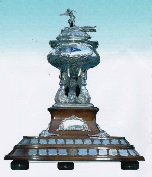A BRIEF HISTORY of the AUSTRALIAN POWER BOAT ASSOCIATION
by Theo H Felstead.
Early History of Australian competition in organised power boat racing appears to have originated from the activities of the "Motor Boat Club" formed in Sydney on the 6th July 1905. Many years later the "Power Boat Association of Australasia" was formed and had its first meeting on the 29th November 1929, at the Royal Motor Yacht Club - Rose Bay in Sydney, with the Club's Commodore, Mr Stuart F Doyle, as chairman. Victorian and Queensland representation attended the meeting and sub committee was appointed to draw up a Constitution and Rules for the purpose of controlling Championships in power boat racing.
Prior to this, the first race for the Australasian Championship and silver Championship Shield, presented by Mr E C Griffith, was held during the 1909-10 season and was won by Mr A Davies' "Fairbanks". During the 1912-13 season, Mr Griffith presented a silver cup for the Australasian Championship and was known as the "Griffith Australasian Championship Cup". The first race was held over a course at Manly, NSW and was won by Mr A Hordern's "Kangaroo".
After a spell of seven years, owing to the 1914-18 war, the race was again held, this time in Adelaide on 25th February 1922, being won by the Rymill Brothers' "Tortoise", the speed being approximately 33 mph. Another inaugural cup, the Albert Cup for the 151 cubic inch class, was donated and first competed for on the 14th March 1925 and was won by Mr J W Breckenridges' "Miss Brec". With outboard motors proving popular in the year 1927, the O'Donoghue Brothers presented the Australian Outboard Championship Shield, which was competed for on the Rose Bay course on 28th April 1928 and was won by Mr E A Williams' "Elto".
The first race to be conducted under the control of the new Association was the "Eastway Shield" for the Championship of NSW and was held on the 28th February 1931 for which the Association Certificate No. 1 was issued. To encourage a championship for displacement boats, Commodore Stuart Doyle presented the "Stuart Doyle Gold Cup" in 1933. Ernest Griffith who had presented the "Griffith Australasian Cup" and had been Honorary Secretary of the Rose Bay Club for 26 years, died on the 8th March 1935. The late Mr Griffith was extremely active in the formation of the Australian Power Boat Association and became its first Honorary Secretary.
During the 1930's an organisation of seven NSW Clubs formed themselves into an Association to promote State Competition, but after discussion, between this body, known as the NSW Motor Boat Association, joined forces with the Australasian Power Boat Association during March 1933. Member clubs at the time were Royal Motor Yacht Clubs - Rose Bay, Broken Bay and Newcastle branches, South Australian Motor Boat Association, Queensland Motor Boat Association, Australian Motor Yacht Squadron, St George Motor Boat Club, Cooks River Motor Boat Club, Deepwater Motor Boat Club, Jewfish Bay Motor Boat Club, Woronora Motor Boat Club and Georges River Motor Boat Club.
The organisation grew steadily and slowly until the outbreak of war in 1939 when activities were suspended for some years. On the 27th November 1944, the Association Council met and prepared for post-war activities in Rule revision, etc. The policy of State autonomy was formulated and pursued by visits interstate and it was during 1953, that the first State Council, that of South Australia was established. All other States followed and on the 18th July 1955, at St George Motor Boat Club, an inaugural dinner was held, with some seventy Club Officers and Delegates attending, to launch the new organisation.
The first National Executive consisted of President - Colonel R S Coates; Vice President - J T Stevens and Honorary Secretary - T H Felstead. Under the new procedures, Annual Meetings are now held and with over forty Clubs, a wealth of trophies and well-founded standardised racing rules, the sport has and will continue to benefit greatly, particularly from the efforts of those Association Officers and Delegates, all of whom spent much time and effort in the early stages, to bring about clean and keen competition for Australasian enthusiasts.


